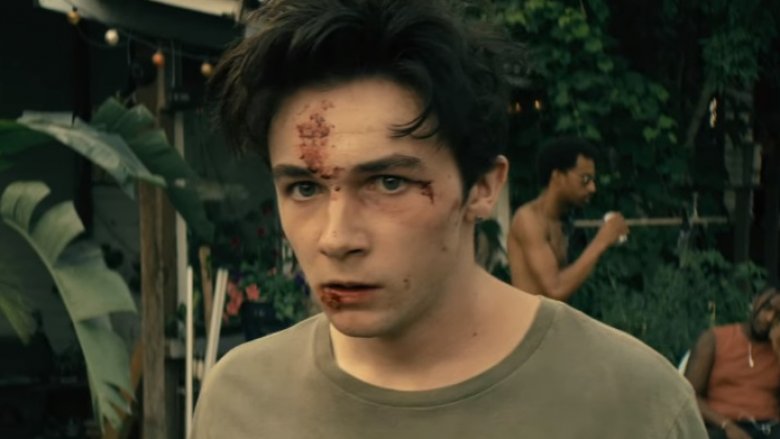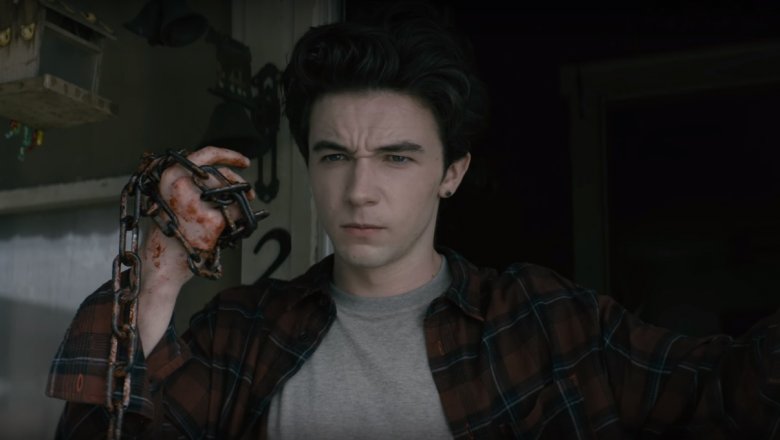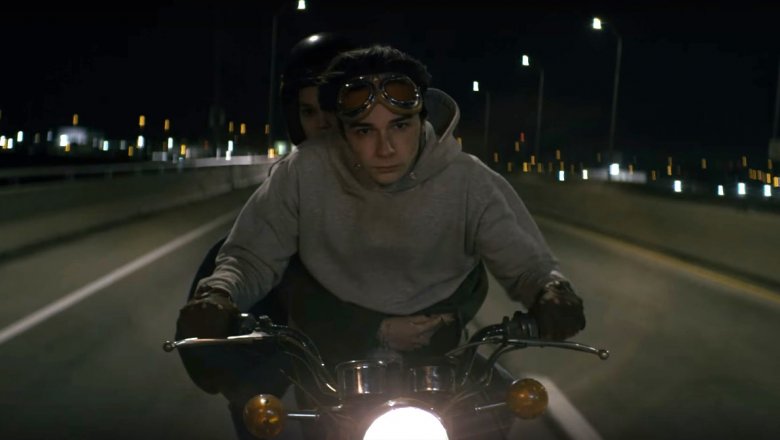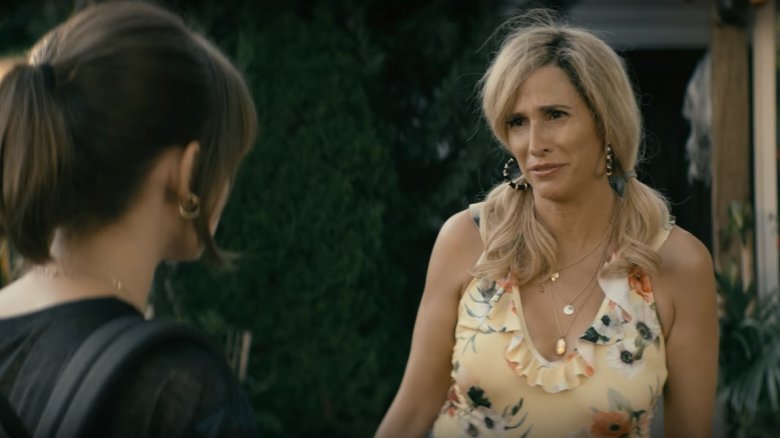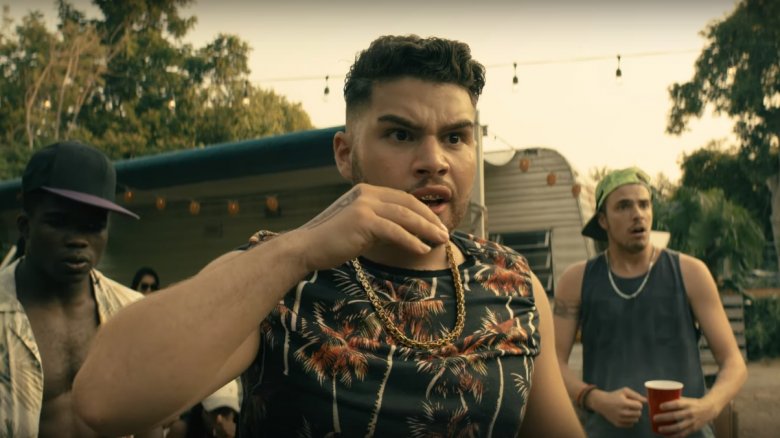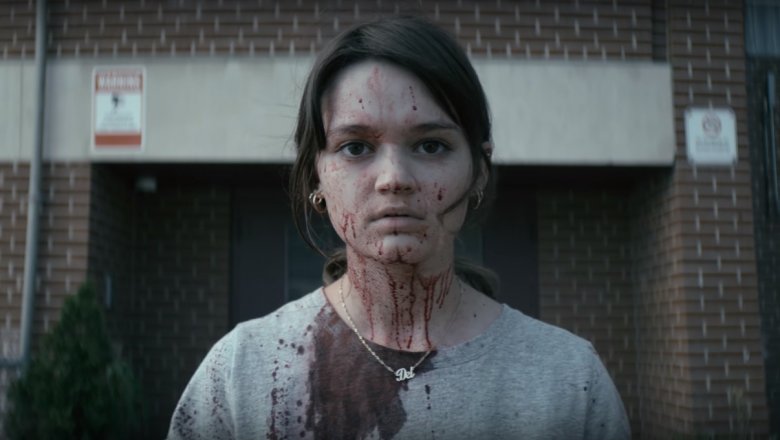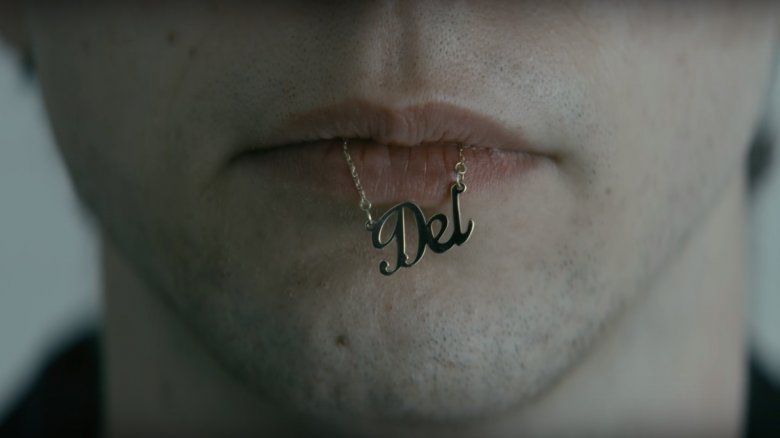The Ending Of Wayne Explained
Before you start watching the series, the name of YouTube Premium's Wayne feels like it could mean just about anything. But by the time the show is over, it feels like a title that tells you all you need to know. What's the show about? Well... it's about that kid Wayne — that absolute madman — the Robin Hood-meets-Dirty Harry of Brockton, Mass. How else could you describe it? It all makes sense once you meet the kid.
Neither hero nor anti-hero, the protagonist of Wayne is more like a force of nature, a teenage dispenser of violent justice whose reputation precedes him. Everywhere he goes, his legend grows, with his enemies being left bruised, bloodied, or — in the case of Del Lucetti's dad — with their nose half-bitten off.
But no matter how mythical Wayne is, he's far from the show's only focus. The second half of the equation is his classmate Del — whose name is definitely not short for Delilah, so don't ask. The two teens are bonded by a traumatic home life, a certain degree of social outcast status, and a tendency to tawk like the Bawston-ist Bostonians to evah wawk the Earth. They work well together; it's actually really cute. They're like the teenage Mad Max versions of a modern-day Bonnie and Clyde.
Wayne and Del spend the majority of the season making their way down the east coast to Ocala, Florida, supposedly for the purpose of retrieving a '79 gold Trans Am that used to belong to Wayne's late father. The car is the closest thing Wayne has to a birthright, being put together with real passion by his dad before it was lost to Wayne's absentee mother, Maureen. Since then, it's ended up in the possession of Curtis and Reggie, the hellishly criminal father and son she ends up living with down south.
At the start of the series, getting the car back makes for such a nakedly thin motivation to cross the country that it almost feels like a part of the show's big joke — all these miles, all this violence, just for the sake of taking back a car. But when the dynamic duo of Wayne and Del actually arrive in Ocala near the season's end, it quickly becomes clear to Del that Wayne came all this way for something more emotionally resonant than a kickass set of wheels. He doesn't just want a family heirloom — he wants family. If he can get the Trans Am back from his dirtbag stepbrother Reggie — if you can even call him that — then all the better.
As capable as he is on his own, Wayne is still just a teenager looking for somewhere to belong. He's so desperate for it that he'd drive across the country to seek affection and acceptance from the mother who abandoned him when he was only five. So what if she lives in, as Del calls it, "a white trash fortress of meth-heads and crocodiles"? After Wayne's dad dies, she and her horrid new family are all he has left.
Wayne never talks about any of this, of course. Though he's not what you'd call nervous around people, Wayne is a definite introvert, keeping his emotions and thoughts guarded at pretty much all times. Arriving with Del in Florida is the first time that he really shows any vulnerability, and his mother's such a terrible person that the effort doesn't really pay off.
At the start of the show, many of the Brockton-based antagonists like police Sergeant Geller and Del's dad and brothers see only malicious evil in Wayne's behavior. They make assumptions of his character, based on the trail of broken bones and blood he tends to leave behind him.
As they follow his tracks toward Florida, Wayne's pursuers think that he's a madman in a bad way. At first, they figure he kidnapped Del — a somewhat reasonable assumption, considering the barbaric level of damage he inflicted on Del's family. But when they start putting questions to the people around town who have experience with Wayne's light side, they uncover a different take on the fugitive teen. Wayne is feared by his enemies, sure — but he's motivated solely by a desire to do good. By the end of the season, Sergeant Geller has come around to that notion, assuring Wayne of his belief that he does what he does out of love.
The source of Wayne's chaotic good nature comes out in Ocala, when Wayne is catching up with Maureen for the first time since she left Brockton, 11 years prior. We learn from Mo's recollections that Wayne became who he is by following the example of his father, who was something of a hometown legend himself as a younger man, before Wayne grew up to usurp that status. Wayne's father, Mo explains, always had a certain code of honor, along with a notorious intensity known to drive neighbors out of town. Everything was always black and white with him, she says — right or wrong, with no middle ground. Sure sounds familiar, doesn't it?
Just like that, we finally learn almost everything we need to know about why Wayne is the way he is. It's a little bit of nature, and a little bit of nurture — or the lack thereof.
At the end of the show's first season, Wayne and Del's trail of destruction finally catches up with them. Sergeant Geller manages to arrest Wayne, with arrangements being made to send him back to Brockton to face the justice system. Del tries to escape with Wayne, but her father and brothers catch up with them too, stopping them in their tracks and successfully shepherding her away from him, whether she likes it or not.
The season seems to end with both protagonists at a personal low, having been captured by everything they were trying to run away from. Looked at one way, it appears they've lost it all. Del is back with her terrible family, and Wayne is incarcerated, probably not for the last time in his life. But they only look like losers when you look at their circumstances, which have always been bad. They may be in physical spaces that are less than ideal, but emotionally, they've grown.
On a personal level, Wayne ends the last episode in an almost triumphant place. After the death of his father, he migrated south to see if he could find a new home with family there. Instead, they all took turns trying to murder each other while his mother sipped boxed wine. Now Wayne knows what the real score is. His future's not with family. His salvation is with Del.
